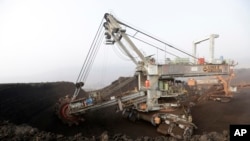While world leaders try to reach a deal to limit climate change, one of the most polluting fossil fuels, brown coal, is enjoying a revival in the Czech Republic, where entire villages are threatened by new plans for mining.
The Czech Republic is one of a group of countries that is turning to coal, a cheap but dirty energy source, as its economy slows. Neighboring Poland, which has big deposits, is doing so, as is China, the world's biggest energy consumer.
The Czech variety of the coal, called brown coal or lignite, is a particularly bad source of greenhouse gases and pollutants.
With support from the president, labor unions and regional leaders and against the protests of environmentalists and local citizens, the Czech government in October approved an increase to mining limits of brown coal in the country’s northwest.
The government is eager to access up to 120 million metric tons of brown coal, which it says is needed to secure the country's energy supply. Last year, the Czech Republic mined 38.8 million metric tons, down 5.5 percent from the previous year.
"We will need this coal for the heating industry, power plants and households,'' Prime Minister Bohuslav Sobotka said.
This marks the first time the country has eased the limits on brown coal mining set in place in 1991, two years after the collapse of the communist regime, which relied heavily on industry and mining. The limits were meant to prevent environmental damage and protect local communities. Under communism, dozens of towns and villages had been eradicated to make space for coal mining.
Although the government's latest decision still prohibits mining that might affect populated areas, it has the option of lifting those limits, too. The government said it will reassess the country's need of brown coal every year until 2020.
The majority of the deposits, which contain about 750 million metric tons more coal than the mining limits allow to be extracted, are located right under the towns of Horni Jiretin and Cernice and go as far as the city of Litvinov, about 4 kilometers (2.5 miles) away.
Part of those deposits are tapped by the open pit mine called CSA, a giant hole in the ground just next to the villages.
"Open-pit mining is devastating. It destroys everything,'' said Vladimir Burt, the mayor of Horni Jiretin, a 750-year-old town with more than 2,200 residents. He noted that even if tapping the deposits does not require relocating the village, the mine's proximity had "very negative health and psychological effects on people.''
Because it is close to the villages, the CSA mine is not allowed to increase production. Some, however, say it is only a matter of time.
"It's likely that we will face further efforts" to expand mining, Burt said. "The miners have a strong ally in the president."
President Milos Zeman said through his spokesman that he believes mining will increase at the CSA mine “sooner or later.''
Severni Energeticka, the company that operates CSA, estimates that without an increase in production, the CSA mine will be phased out by 2022-'25, said spokeswoman Gabriela Sarickova Benesova.
She notes the mining company is the biggest taxpayer in a region that suffers from higher than average unemployment, provides 1,400 jobs and is ready to invest $1.2 billion in the mine's potential expansion.
Environmental activists say the ecological damage would outweigh any economic benefits.
"To lift the limits makes no sense,'' said Jan Rovensky of Greenpeace. "What is really at stake is the profit of mining companies.''











